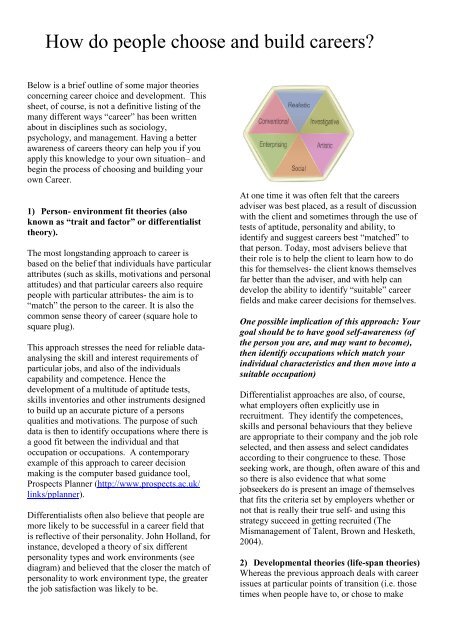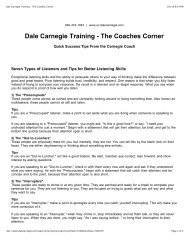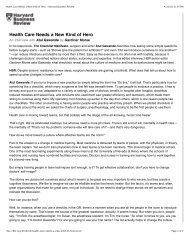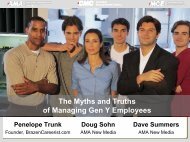How do people choose and build careers? - Writersblok1.org
How do people choose and build careers? - Writersblok1.org
How do people choose and build careers? - Writersblok1.org
Create successful ePaper yourself
Turn your PDF publications into a flip-book with our unique Google optimized e-Paper software.
<strong>How</strong> <strong>do</strong> <strong>people</strong> <strong>choose</strong> <strong>and</strong> <strong>build</strong> <strong>careers</strong>?<br />
Below is a brief outline of some major theories<br />
concerning career choice <strong>and</strong> development. This<br />
sheet, of course, is not a definitive listing of the<br />
many different ways “career” has been written<br />
about in disciplines such as sociology,<br />
psychology, <strong>and</strong> management. Having a better<br />
awareness of <strong>careers</strong> theory can help you if you<br />
apply this knowledge to your own situation– <strong>and</strong><br />
begin the process of choosing <strong>and</strong> <strong>build</strong>ing your<br />
own Career.<br />
1) Person- environment fit theories (also<br />
known as “trait <strong>and</strong> factor” or differentialist<br />
theory).<br />
The most longst<strong>and</strong>ing approach to career is<br />
based on the belief that individuals have particular<br />
attributes (such as skills, motivations <strong>and</strong> personal<br />
attitudes) <strong>and</strong> that particular <strong>careers</strong> also require<br />
<strong>people</strong> with particular attributes- the aim is to<br />
“match” the person to the career. It is also the<br />
common sense theory of career (square hole to<br />
square plug).<br />
This approach stresses the need for reliable dataanalysing<br />
the skill <strong>and</strong> interest requirements of<br />
particular jobs, <strong>and</strong> also of the individuals<br />
capability <strong>and</strong> competence. Hence the<br />
development of a multitude of aptitude tests,<br />
skills inventories <strong>and</strong> other instruments designed<br />
to <strong>build</strong> up an accurate picture of a persons<br />
qualities <strong>and</strong> motivations. The purpose of such<br />
data is then to identify occupations where there is<br />
a good fit between the individual <strong>and</strong> that<br />
occupation or occupations. A contemporary<br />
example of this approach to career decision<br />
making is the computer based guidance tool,<br />
Prospects Planner (http://www.prospects.ac.uk/<br />
links/pplanner).<br />
Differentialists often also believe that <strong>people</strong> are<br />
more likely to be successful in a career field that<br />
is reflective of their personality. John Holl<strong>and</strong>, for<br />
instance, developed a theory of six different<br />
personality types <strong>and</strong> work environments (see<br />
diagram) <strong>and</strong> believed that the closer the match of<br />
personality to work environment type, the greater<br />
the job satisfaction was likely to be.<br />
At one time it was often felt that the <strong>careers</strong><br />
adviser was best placed, as a result of discussion<br />
with the client <strong>and</strong> sometimes through the use of<br />
tests of aptitude, personality <strong>and</strong> ability, to<br />
identify <strong>and</strong> suggest <strong>careers</strong> best “matched” to<br />
that person. Today, most advisers believe that<br />
their role is to help the client to learn how to <strong>do</strong><br />
this for themselves- the client knows themselves<br />
far better than the adviser, <strong>and</strong> with help can<br />
develop the ability to identify “suitable” career<br />
fields <strong>and</strong> make career decisions for themselves.<br />
One possible implication of this approach: Your<br />
goal should be to have good self-awareness (of<br />
the person you are, <strong>and</strong> may want to become),<br />
then identify occupations which match your<br />
individual characteristics <strong>and</strong> then move into a<br />
suitable occupation)<br />
Differentialist approaches are also, of course,<br />
what employers often explicitly use in<br />
recruitment. They identify the competences,<br />
skills <strong>and</strong> personal behaviours that they believe<br />
are appropriate to their company <strong>and</strong> the job role<br />
selected, <strong>and</strong> then assess <strong>and</strong> select c<strong>and</strong>idates<br />
according to their congruence to these. Those<br />
seeking work, are though, often aware of this <strong>and</strong><br />
so there is also evidence that what some<br />
jobseekers <strong>do</strong> is present an image of themselves<br />
that fits the criteria set by employers whether or<br />
not that is really their true self- <strong>and</strong> using this<br />
strategy succeed in getting recruited (The<br />
Mismanagement of Talent, Brown <strong>and</strong> Hesketh,<br />
2004).<br />
2) Developmental theories (life-span theories)<br />
Whereas the previous approach deals with career<br />
issues at particular points of transition (i.e. those<br />
times when <strong>people</strong> have to, or chose to make
career decisions) life span theories take a longer<br />
term developmental perspective.<br />
Life span theorists argue that there are distinct<br />
stages which <strong>people</strong> go through in the course of<br />
their lives (Donald Super, a prominent stage<br />
theorist, proposed that the stages comprised<br />
Growth, Exploration, Establishment, Maintenance<br />
<strong>and</strong> Decline). <strong>How</strong> we negotiate these stages, <strong>and</strong><br />
how we reflect on them has a major impact on the<br />
success of our life. During our lives we also play<br />
a variety of different roles (often at the same time)<br />
such as worker, partner, parent <strong>and</strong> leisurite (see<br />
the simple version of Supers life career rainbow<br />
below). <strong>How</strong> much time we chose, or have to,<br />
devote to these different roles will vary dependant<br />
on our own inclination <strong>and</strong> other influences.<br />
Those advocating a lifespan approach stress<br />
ongoing career development, rather than career<br />
choice. Quite often, individuals thinking about<br />
career only focus on the present <strong>and</strong> near future<br />
(getting a job/beginning a career) <strong>and</strong> <strong>do</strong>n’t<br />
consider what type of “career” in its wider sense<br />
that they wish to pursue <strong>and</strong> the possible<br />
consequences of particular career choices for their<br />
wider life.<br />
Good career decisions involve thinking about the<br />
immediate but also taking a longer term view<br />
<strong>and</strong> considering the wider situation, <strong>and</strong> being<br />
aware that career is a continuous process that<br />
requires frequent re-evaluation <strong>and</strong> renewal.<br />
Another implication of this approach is that<br />
<strong>people</strong> can often experiment with different jobs<br />
before finding the right “fit” for them, <strong>and</strong> that<br />
what might be the right “fit” may change<br />
significantly during ones life.<br />
3) Structural theories.<br />
Whereas the previous approaches stress the role<br />
of the individual, structural theories of career<br />
focus on the influence of the environment on<br />
<strong>careers</strong> choice. Individual career decisions are, it<br />
is argued, mostly determined by the labour market<br />
situation (ones own situation in it, the state of the<br />
labour market at the time one has to make<br />
choices, etc). Other factors over which the<br />
individual has little, if any, control include the<br />
potential discriminatory effects of class<br />
background, of ethnicity, gender <strong>and</strong> disability,<br />
<strong>and</strong> the location that the c<strong>and</strong>idate wants or needs<br />
to get employment in or near.<br />
Popular <strong>careers</strong> books <strong>and</strong> articles also often write<br />
about “career choice” as if it were solely the<br />
prerogative of the individual making his or her<br />
choice or choices. But this approach can ignore<br />
the fact that it is not solely the individual that is<br />
making choices but that a career is also<br />
determined by choices made by others. While an<br />
individual may identify a particular career <strong>and</strong> try<br />
to get into it- others (most particularly the <strong>people</strong><br />
selecting c<strong>and</strong>idates for roles) will determine<br />
whether that person <strong>do</strong>es get a chance to begin<br />
their career in that field. Think back to your own<br />
situation prior to coming to Oxford- while you<br />
made the choice to apply to study here, a tutor<br />
chose to have you!<br />
Being aware of structural factors that influence<br />
our own career paths can encourage a fatalistic<br />
approach to planning a career, just taking what<br />
is on offer. But it can also lead to an awareness<br />
that because the individual is not in sole control<br />
of their future, it may be easier to remain<br />
motivated when facing problems (for example, if<br />
initially unsuccessful moving into a particular<br />
career field, the individual <strong>do</strong>esn’t need to feel<br />
that the problem is simply themselves).<br />
But in a sense it is more than simply that ones<br />
access to opportunities <strong>and</strong> hence career is often<br />
determined by others. Because of our<br />
environment <strong>and</strong> upbringing we may also<br />
ourselves begin to limit what we think is possible<br />
(our horizons for action are limited). Various<br />
sociologists have noted how young <strong>people</strong> often<br />
internalise the values <strong>and</strong> behaviours that others<br />
in their communities have, thereby ensuring that<br />
they themselves lead very similar lives to their<br />
peers. In an Oxford situation, some students<br />
similarly a<strong>do</strong>pt an approach whereby the <strong>careers</strong><br />
they are willing to consider are those which they<br />
think others will value (“I’d be letting myself <strong>and</strong><br />
my family <strong>do</strong>wn if I didn’t go into a typical
Oxbridge career”) rather than what they might<br />
otherwise <strong>choose</strong> <strong>and</strong> which could actually suit<br />
them better <strong>and</strong> hence lead to a successful <strong>and</strong><br />
satisfying career.<br />
It is important not to limit what we <strong>choose</strong> to <strong>do</strong>,<br />
by what we think others will think of us, but to<br />
make career decisions based on an<br />
underst<strong>and</strong>ing of what we value <strong>and</strong> decide is<br />
right for us. Another implication of this<br />
approach is that it is possible to move into a role<br />
that isn't usually considered a graduate job, but<br />
to identify <strong>and</strong> implement ways of “growing” the<br />
role to a graduate level post.<br />
4) Happenstance- how important is chance in a<br />
career?<br />
Happenstance, the final theoretical approach<br />
discussed here, stresses chance in individual<br />
career development. Studies conducted of <strong>people</strong><br />
who have built successful <strong>careers</strong> often show that<br />
they had not developed their <strong>careers</strong> in ways<br />
suggested by theorists. Rather than spending time<br />
carefully weighing up their skills <strong>and</strong> qualities<br />
<strong>and</strong> then choosing suitable occupations this often<br />
<strong>do</strong>esn’t happen. Instead many <strong>people</strong> start in a<br />
career as a result of some or all of luck, a whim,<br />
some other unplanned event, family or other<br />
connection, etc. And even for those who have<br />
planned their career in a structured <strong>and</strong> systematic<br />
way it is often the case that a later chance event<br />
leads to career change into a more satisfying <strong>and</strong><br />
rewarding career. Whereas traditional career<br />
theory <strong>do</strong>esn’t allow for this, or is often<br />
disparaging about <strong>careers</strong> built without conscious<br />
career planning, this theoretical approach<br />
recognises unplanned, serendipitous events as<br />
both inevitable <strong>and</strong> desirable.<br />
It is not always necessary to plan a career in the<br />
conventional sense. Instead it is important to<br />
prepare for happenstance. Developing skills <strong>and</strong><br />
attributes that could be useful in all sorts of<br />
situations is key. And then it is important to be<br />
curious (finding out about things related to<br />
work) <strong>and</strong> always to look on chance events as<br />
opportunities that could lead to action- the point<br />
is to transform unplanned events into career<br />
opportunities.<br />
Questions you could consider<br />
• Do any of these career theories seem<br />
particularly relevant to you?<br />
• Or perhaps you could suggest an<br />
alternative approach to career based<br />
on your own experience, or course?<br />
• What structural factors <strong>do</strong> you feel<br />
could impact on your career decisions?<br />
• Have you considered the longer term<br />
consequences of your choices/<br />
decisions (in 3,5 or even 10 years<br />
time)?
Further reading<br />
Available for loan from the <strong>careers</strong> service<br />
A good starting point is Chapter One “Theories of career decision making” in Jennifer M Kidd, Underst<strong>and</strong>ing<br />
Career Counselling (2006) which covers Person-Environment <strong>and</strong> Structural Theories (<strong>and</strong><br />
some other approaches not mentioned above).<br />
Brown <strong>and</strong> Hesketh, The Mismanagement of Talent (2004). They have also produced a more populist<br />
book for jobseekers based on their research, <strong>How</strong> to get the best Graduate Job (2005).<br />
Kerr Inkson, Underst<strong>and</strong>ing Careers (2007). A very good, readable <strong>and</strong> comprehensive book aimed at<br />
students interested in career studies, <strong>and</strong> how they can apply this knowledge to their own situation.<br />
Leonie Sugarman, Life-Span Development, Frameworks, Accounts <strong>and</strong> Strategies (2001).<br />
Useful articles available on-line include:<br />
The National Guidance Research Forum has a section on Careers Theory with a number of useful articles.<br />
http://www.guidance-research.org/EG/impprac/ImpP2/<br />
Helen Colley, Do we <strong>choose</strong> <strong>careers</strong> or <strong>do</strong> they <strong>choose</strong> us? (2004), Vejleder Forum No 4 http://<br />
www.vejlederforum.dk/page3.apsx?recordid3=228<br />
Wikipedia contains profiles of various prominent career theorists including John L Holl<strong>and</strong>, Frank Parsons<br />
(sometimes known as the “father of vocational guidance”) <strong>and</strong> brief articles on career, career development<br />
<strong>and</strong> career management http://wikipedia.org<br />
Our website has a section considering the career decision making process, called Planning your Career<br />
http://www.<strong>careers</strong>.ox.ac.uk/homepage/pyc<br />
Useful articles available on-line from OULS include:<br />
Kathleen Mitchell, Al Levin, John Krumboltz (1999) Planned Happenstance: Constructing Unexpected<br />
Career Opportunities, Journal of Counseling <strong>and</strong> Development, Volume 77.<br />
Donald E. Super (1980), A life-span, life-space approach to career development<br />
Journal of Vocational Behavior, Volume 16, Issue 3.<br />
Books available within the Oxford Libraries scheme include:<br />
Irving, BA <strong>and</strong> Malik, B, Critical reflections on Careers Education <strong>and</strong> Guidance: Promoting social justice<br />
within a global economy (2005) available in the Social Science Library- see particularly the chapter by<br />
Ken Roberts for a challenging structuralist view of career choice <strong>and</strong> decision making.<br />
This han<strong>do</strong>ut has been funded from a grant given by the Centre for Careers Management Skills (CCMS), based at the University<br />
of Reading (http://www.reading.ac.uk/ccms/), <strong>and</strong> written by Angus McKendrick, a <strong>careers</strong> adviser at Oxford University<br />
Careers Service <strong>and</strong> a partner fellow of the CCMS.






